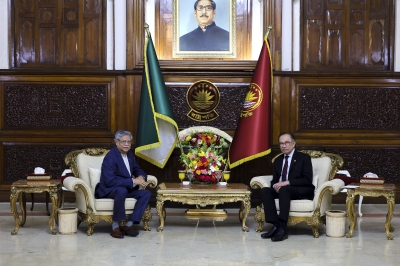Malaysia PM may visit Bangladesh in a couple of months

File photo
Malaysian Prime Minister Anwar Ibrahim may visit Bangladesh soon at the invitation of Chief Adviser Prof Muhammad Yunus.
"The Malaysian prime minister expressed his willingness to visit Bangladesh during the phone call. We may see him coming to Dhaka in a month or two," a foreign ministry official told this correspondent.
"Prof Yunus has invited me to undertake a short visit to Bangladesh as soon as possible to further strengthen the brotherly relationship between the two countries," Anwar Ibrahim posted on X following the phone call on Tuesday evening.
He also congratulated his "old friend" Prof Yunus on his appointment as the chief advisor to the interim government of Bangladesh.
"Prof Yunus has long-standing good ties with Malaysia. Thus, I assured him that Malaysia stands ready to help and support the interim government in rebuilding and restoring peace and security in Bangladesh," Ibrahim added.
He also said Prof Yunus has given him assurances that he will protect the rights of all Bangladeshis including minorities.
Bangladesh and Malaysia have a bilateral trade of $2.7 billion. Of the amount, Bangladesh exports goods worth some $370 million to Malaysia.
Also, about eight lakh Bangladeshis are working in Malaysia.
During the phone call, Prof Yunus also hoped that more Bangladeshis would get scope to work in the Southeast Asian country.
File photo
Malaysian Prime Minister Anwar Ibrahim may visit Bangladesh soon at the invitation of Chief Adviser Prof Muhammad Yunus.
"The Malaysian prime minister expressed his willingness to visit Bangladesh during the phone call. We may see him coming to Dhaka in a month or two," a foreign ministry official told this correspondent.
"Prof Yunus has invited me to undertake a short visit to Bangladesh as soon as possible to further strengthen the brotherly relationship between the two countries," Anwar Ibrahim posted on X following the phone call on Tuesday evening.
He also congratulated his "old friend" Prof Yunus on his appointment as the chief advisor to the interim government of Bangladesh.
"Prof Yunus has long-standing good ties with Malaysia. Thus, I assured him that Malaysia stands ready to help and support the interim government in rebuilding and restoring peace and security in Bangladesh," Ibrahim added.
He also said Prof Yunus has given him assurances that he will protect the rights of all Bangladeshis including minorities.
Bangladesh and Malaysia have a bilateral trade of $2.7 billion. Of the amount, Bangladesh exports goods worth some $370 million to Malaysia.
Also, about eight lakh Bangladeshis are working in Malaysia.
During the phone call, Prof Yunus also hoped that more Bangladeshis would get scope to work in the Southeast Asian country.















